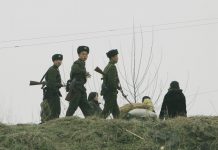China’s decision to implement strong
international sanctions against North Korea has forced the regime to devise new
methods to smuggle in metals such as titanium that are essential in weapons
manufacturing. Daily NK has learned that Pyongyang is using its trade companies
to hide titanium plates on the bottoms of their trucks when crossing the
border, in order to enable uninterrupted supply.
“We heard that sanctions were kicking in
and not long after that, the supply for titanium plates used for weapons manufacturing
dried up,” a source from North Pyongan Province told Daily NK on Wednesday.
“The Dandong customs office (in China) is closely watching all goods related to
weapons production, so they haven’t officially been permitted to come through
since March,” the source explained.
Sources in the same province and South
Pyongan Province corroborated this news.
A titanium plate (20 mm x 200 mm x 200 mm)
costs approximately 1,000 to 1,500 RMB, and those manufactured for military
purposes are being smuggled into Sinuiju hidden underneath trucks, claimed the
source.
Due to its lightness and strength, titanium
has multiple applications in industries like shipbuilding, chemicals, and oil
refineries, and is also used as a material to build nuclear reactors and airplanes.
The metal has good thermal resistance, which is why it is frequently used in
the North to manufacture missiles and other weapons.
In other words, for Pyongyang’s nuclear and
long-range missile development plans, titanium is an essential material. “There
are titanium mines here as well, but the quality is not as good so we’re
dependent on imports,” the source explained.
Beijing’s participation in global sanctions
has threatened Pyongyang’s supply chain. The source reported that even if a
single titanium plate is uncovered during customs inspections in Dandong, it
can lead to the seizure of all goods on the truck and an investigation into the
Chinese counterpart who sold the titanium and the vehicle used to transport it.
In light of these developments, the
leadership has ordered its trade companies to “use all means possible” to bring
in the material, leading to creative methods such as attaching the plates to
the bottom of cargo trucks.
The Chinese government has also prohibited
trade in any materials that could be used for military purposes, additionally
putting the damper on solar panel production within the North.
“These days, they’re even placing
restrictions on the smaller titanium plates that are used to make solar
panels,” the source said. “Ahead of the 7th Party Congress, when they are
supposed to promote Kim Jong Un’s legacy of resolving the power shortage
through solar energy, panel production is on the brink of coming to a halt.”
For this reason, trade companies are under
increased pressure to find new ways to secure their supply of titanium plates,
offering their Chinese counterparts higher prices. Faltering solar panel
production could lead to negative “loyalty assessments” during the upcoming
chonghwa (self-criticism sessions) for the “70-Day Battle,” the source said.



















